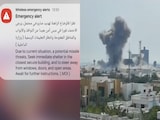The Supreme Court was apprised on Tuesday that the Union government has withdrawn its directive to block the YouTube channel 4PM News Network.
A bench of Justices BR Gavai and AG Masih was hearing a plea filed by journalist Sanjay Sharma challenging the Centre's directive to block his news channel on YouTube on the grounds of "national security" and "public order".
Senior advocate Kapil Sibal, appearing on the petitioner's behalf, submitted that since the blocking order has been withdrawn by the authorities, the prayer for interim relief has turned infructuous.
However, Mr Sibal pressed the prayer contained in the petition challenging the constitutional validity of the Information Technology (IT) Blocking Rules, 2009.
In view of the submission, the top court ordered tagging the instant petition with the pending batch of pleas raising similar issues. Last week, the Justice Gavai-led Bench issued notice on the plea filed by the editor of the digital news platform and sought responses from the Union government, including the Ministry of Home Affairs, and YouTube.
When a prayer for interim relief was pressed, the Top Court had said that it was not inclined to pass any stay order without hearing from the government. In his writ petition filed before the Top Court, journalist Sanjay Sharma said that non-furnishing of the blocking order or underlying complaint violated statutory and constitutional safeguards.
"Rules 8, 9, and 16 of the Information Technology (Procedure and Safeguards for Blocking for Access of Information by Public) Rules, 2009, which permit blocking without notice or hearing, are violative of Articles 14, 19(1)(a), and 21 of the Constitution, as they oust the principles of natural justice and enable a shadow regime of censorship devoid of transparency or accountability," stated the petition filed through Talha Abdul Rahman.
Further, it said that the Constitution does not permit the blanket removal of content without an opportunity to be heard.
"'National security' and 'public order' are not talismanic invocations to insulate executive action from scrutiny. They are constitutionally recognised grounds under Article 19(2), but are subject to the test of reasonableness and proportionality," the plea said.
A vague reference to these grounds, without even disclosing the offending content, makes it impossible for the petitioner to challenge or remedy the allegation, thereby depriving him of his fundamental right to free speech and fair hearing, added the petition.
The Editors Guild of India, in a recent press statement, said that it was "deeply concerned" by the decision of the Union government to block YouTube Channel 4PM News Network, and termed the move an "opaque use of executive power, without prior notice or opportunity for response". "Arbitrary takedown orders undermine the fundamental right to freedom of speech.
The Guild reiterated its demand for a transparent and accountable mechanism for content takedowns, particularly when it concerns journalistic work. National security cannot become a pretext to silence critical voices or independent reporting," added the press statement.
(Except for the headline, this story has not been edited by NDTV staff and is published from a syndicated feed.)















